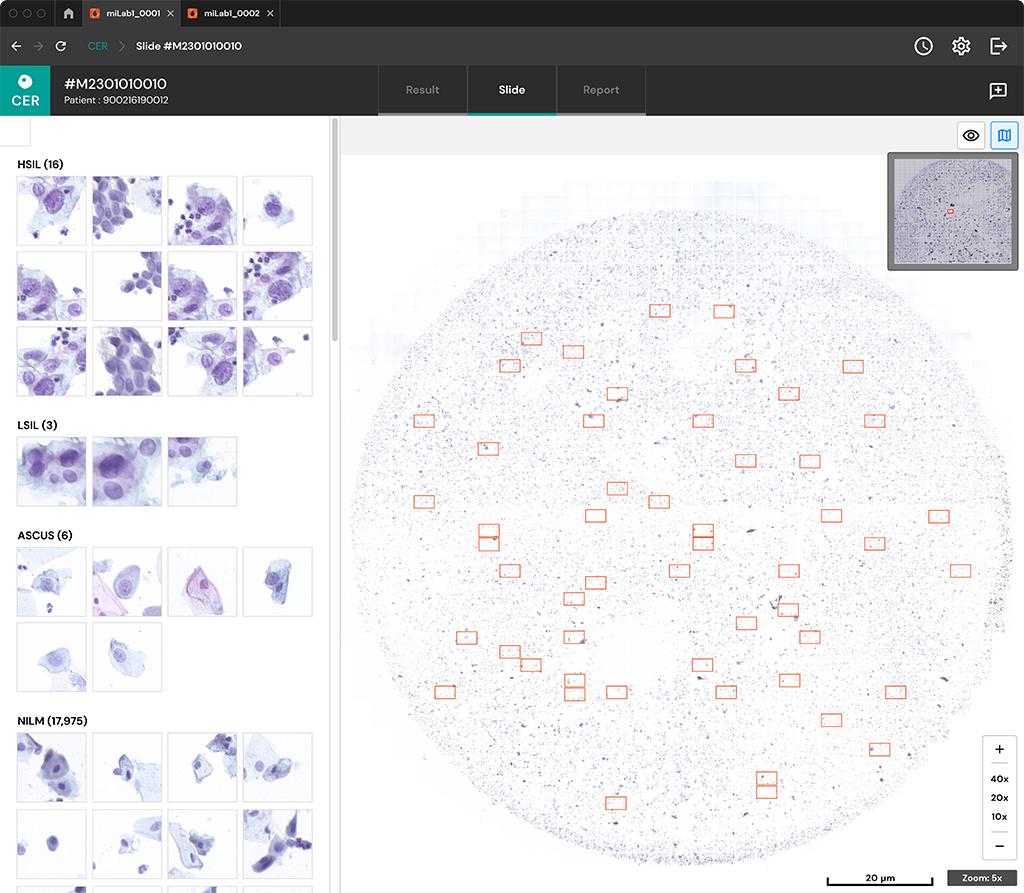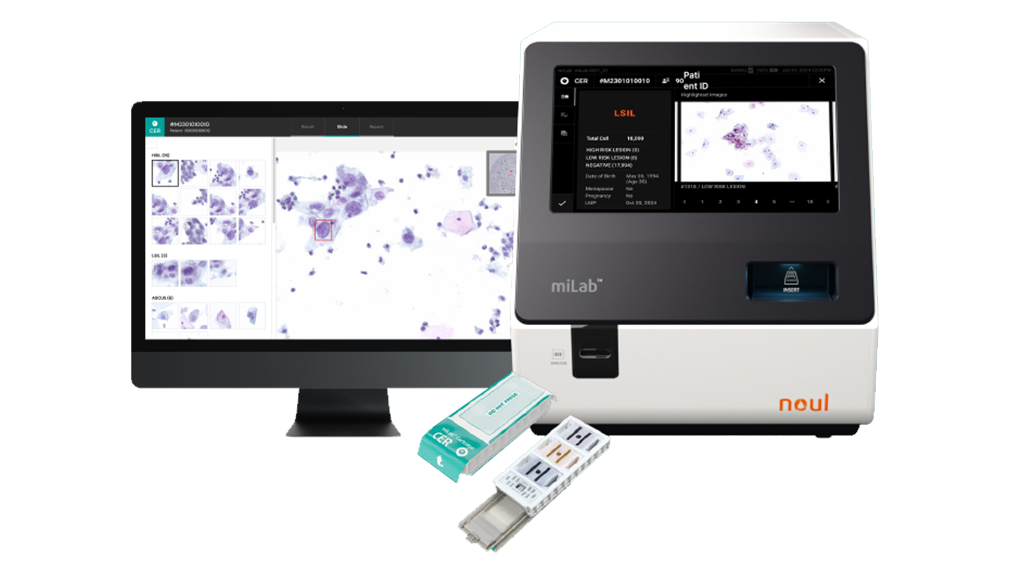Introduction
The early detection of cervical abnormalities and cancer is vital to reducing mortality and improving outcomes. To support this goal, miLab™ CER specializes in identifying key cervical markers, including HSIL, NILM, LSIL, ASC-US, ASC-H, and SCC, delivering precise and timely diagnostic insights to healthcare providers.
miLab™ CER represents a breakthrough in automated diagnostics, leveraging advanced AI technology to assist in the accurate identification of cervical abnormalities and enhance patient care.
Cervical Cancer Markers – What miLab™ CER Analyzes
 Source : NOUL
Source : NOUL
miLab™ CER is designed to analyze major cervical cancer markers and stages, which provides an accurate and early diagnosis.
Let’s break these down:
LSIL (Low-Grade Squamous Intraepithelial Lesion)
LSIL represents mild cellular changes that are commonly associated with HPV infection. miLab™ CER’s advanced capabilities allow the early identification of these lesions, which makes sure healthcare providers are able to monitor or intervene in a timely fashion.
HSIL (High-Grade Squamous Intraepithelial Lesion)
HSIL indicates severe cellular changes that have a higher risk of progressing to cervical cancer. miLab™ CER’s precision allows healthcare providers to detect HSIL promptly, which makes it easier to take immediate action and prevent progression.
ASC-H (Atypical Squamous Cells – Cannot Exclude HSIL)
The positive results of ASC-H indicate atypical squamous cells that may suggest high-grade lesions. miLab™ CER’s AI-driven analysis provides a reliable diagnosis.
ASC-US (Atypical Squamous Cells of Undetermined Significance)
ASC-US (Atypical Squamous Cells of Undetermined Significance) refers to cell abnormalities that do not clearly indicate cancerous changes. miLab™ CER can identify these cells and guide further examination, which ensures the early detection of potential issues. This capability is indispensable to manage ambiguous cases more effectively.
SCC (Squamous Cell Carcinoma)
SCC (Squamous cell carcinoma) is an advanced stage of cervical cancer. In fact, it requires urgent detection. miLab™ CER’s high-resolution imaging ensures the accurate identification of SCC, which improves the chances of effective treatment.
NILM (Negative for Intraepithelial Lesion or Malignancy)
NILM confirms the absence of abnormalities. miLab™ CER’s diagnostics provide reassurance through precise negative results. At the same time, it aids in the organization of regular monitoring.
The Importance of Early Detection: Role of miLab™ CER in Identifying Precancerous and Cancerous Lesions
The early screening is important as it reduces cervical cancer mortality. miLab™ CER’s advanced technology helps in the detection of abnormalities at their earliest stages.
LSIL and HSIL
The differentiation between LSIL (less likely to progress) and HSIL (a higher risk) is done through miLab™ CER. This aids in the personalization of patient management. What’s more, early identification minimizes the chances of cancer development.
ASC-H, ASC-US, and SCC
The precision of miLab™ CER ensures accurate detection of ASC-H, which may progress to HSIL, ASC-US (requires further investigation), and SCC. This is critical for the prognosis of patients.
Accuracy and Precision of miLab™ CER in Cancer Detection
 Source : NOUL
Source : NOUL
AI Integration
miLab™ CER integrates AI to analyze cervical samples with extremely high accuracy. This reduces the need for additional testing due to errors.
Enhanced Diagnostic Performance
The system distinguishes between benign, low-grade, and high-grade lesions with remarkable precision. It also identifies squamous cell carcinoma through advanced imaging technology.
Comparison with Traditional Methods
Traditional methods such as Pap smears are limited by the expertise of the user. On the other hand, miLab™ CER’s automation improves reliability, minimizes false positives and negatives, and provides a superior diagnostic alternative to traditional methods.
How miLab™ CER Works: AI-Driven Image Analysis and Its Impact on Diagnostics
 Source : NOUL
Source : NOUL
AI-Driven Technology
miLab™ CER uses machine learning algorithms to analyze Pap smear slides faster and more accurately than manual methods.
Role of High-Resolution Imaging
The system’s high-resolution imaging and AI processing detect subtle cellular changes. It evaluates the squamocolumnar junction and transformational zone for early cancer detection, which enhances diagnostic confidence.
Impact on Clinical Workflows
Automation streamlines the analysis, reduces diagnostic time, and improves clinical decision-making. All of these features make miLab™ CER a valuable tool for healthcare providers.
Global Impact: miLab™ CER’s Role in Cervical Cancer Prevention Worldwide
With the global rise in cervical cancer cases, effective screening has become indispensable. miLab™ CER addresses this need as it provides advanced diagnostic capabilities compared to what’s available on the market.
Global Reach of miLab™ CER
miLab™ CER’s AI-powered diagnostics make screening accessible in resource-limited regions.
Cost Efficiency and Scalability
Cost-effective and scalable, miLab™ CER is ideal for diverse clinical settings, which allows for widespread adoption and improved global cervical health.
Healthcare Providers with miLab™ CER – Better Cervical Health Outcomes
miLab™ CER revolutionizes cervical cancer diagnostics by accurately detecting abnormalities, from LSIL and HSIL to NILM. Early detection improves outcomes and saves lives. Healthcare institutions are strongly encouraged to integrate miLab™ CER into their workflows to enhance cervical cancer screening.
The following table demonstrates the markers that are detected by miLab™ CER:
Conclusion
 Source : NOUL
Source : NOUL
miLab™ CER introduces innovative techniques for cervical cancer diagnostics. With unmatched accuracy, precision, and accessibility, it enables the detection of critical markers including LSIL, HSIL, ASC-H, ASC-US (Atypical Squamous Cells with Undetermined Significance), SCC (Squamous Cell Carcinoma), and NILM. These advanced capabilities improve early detection, save lives, and elevate global healthcare outcomes.
Healthcare institutions are urged to adopt miLab™ CER for cutting-edge cervical health diagnostics. Contact us today to learn how miLab™ CER can transform your diagnostic capabilities and help prevent the progression of cervical abnormalities to cancer.

